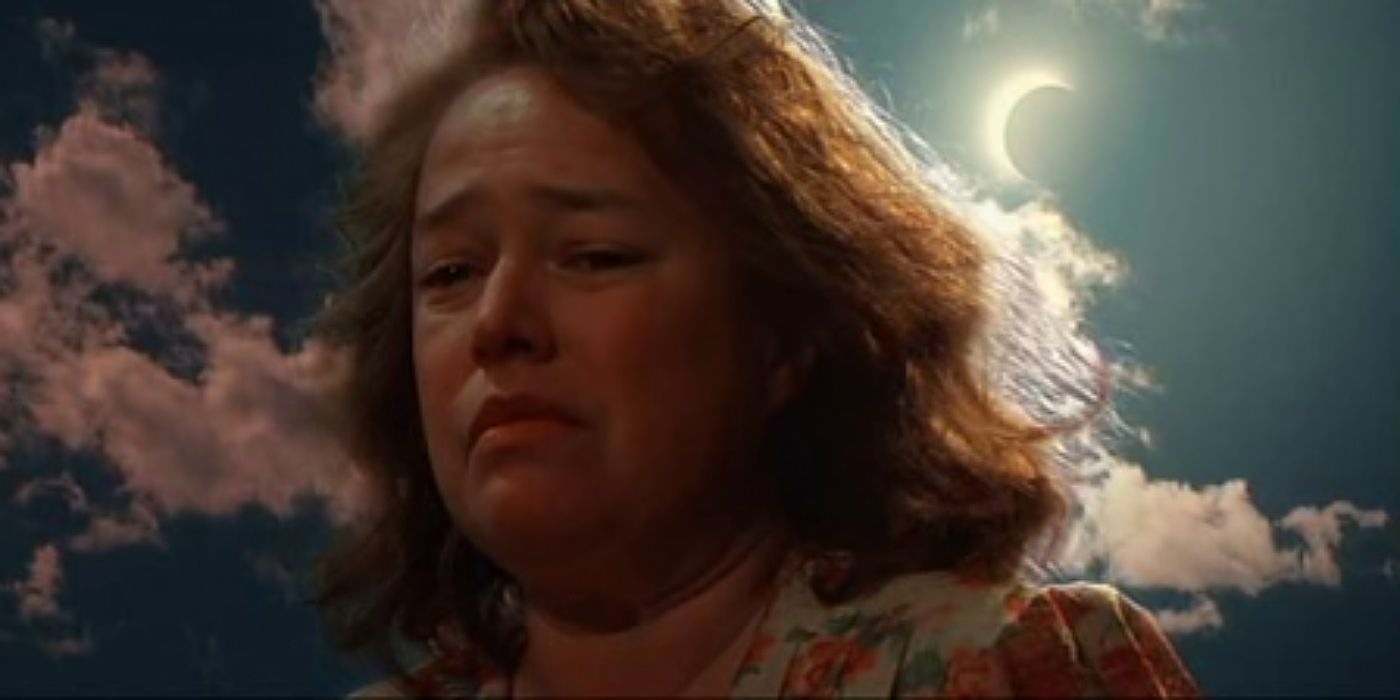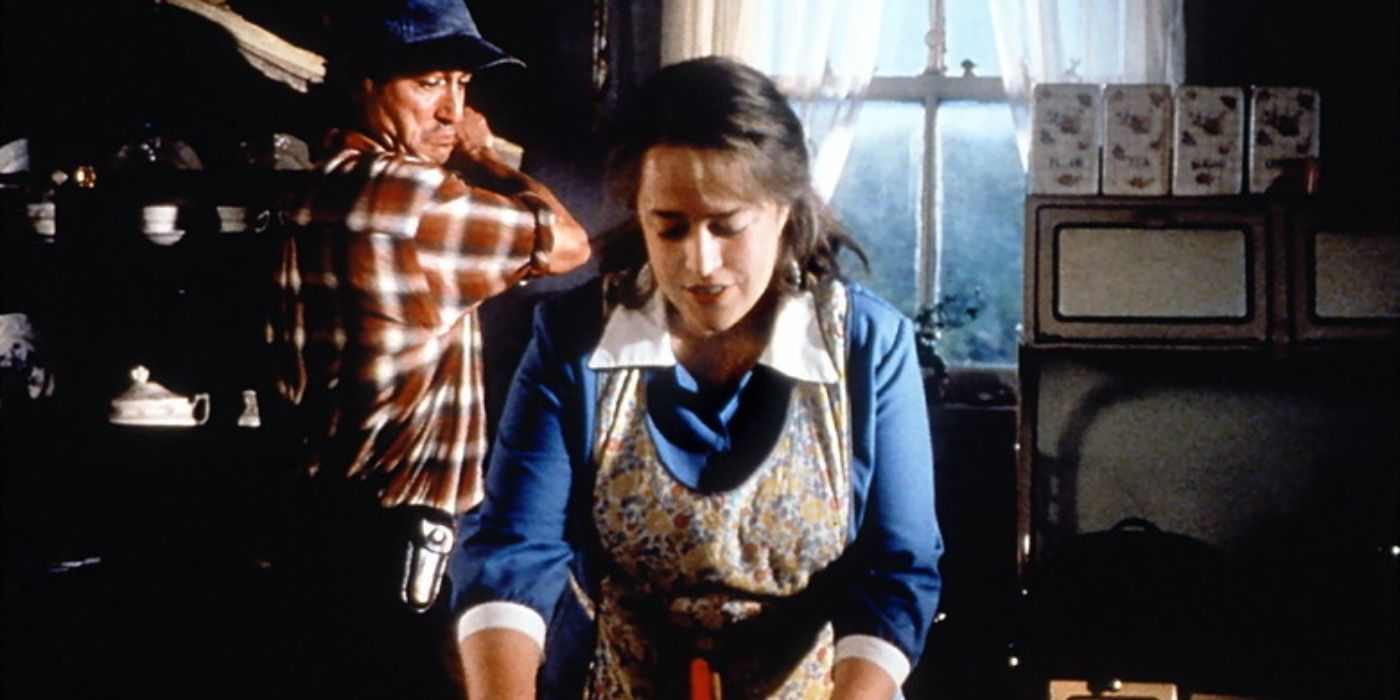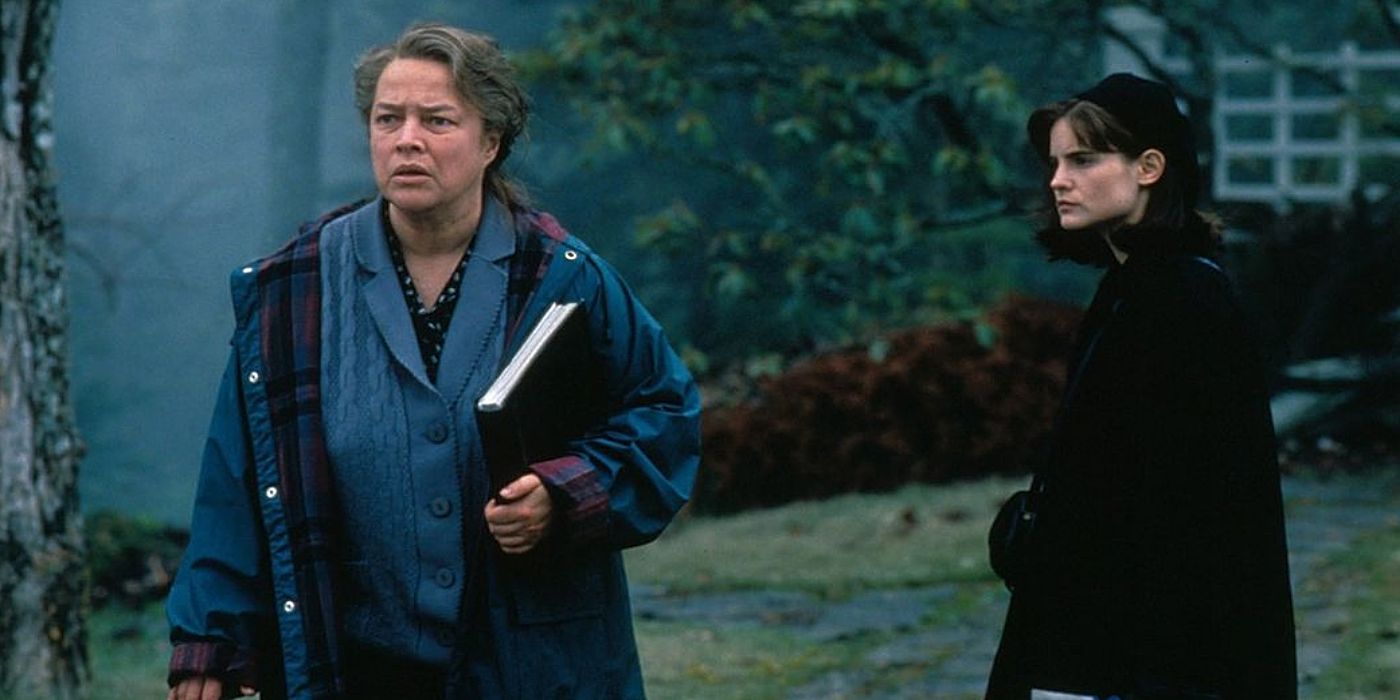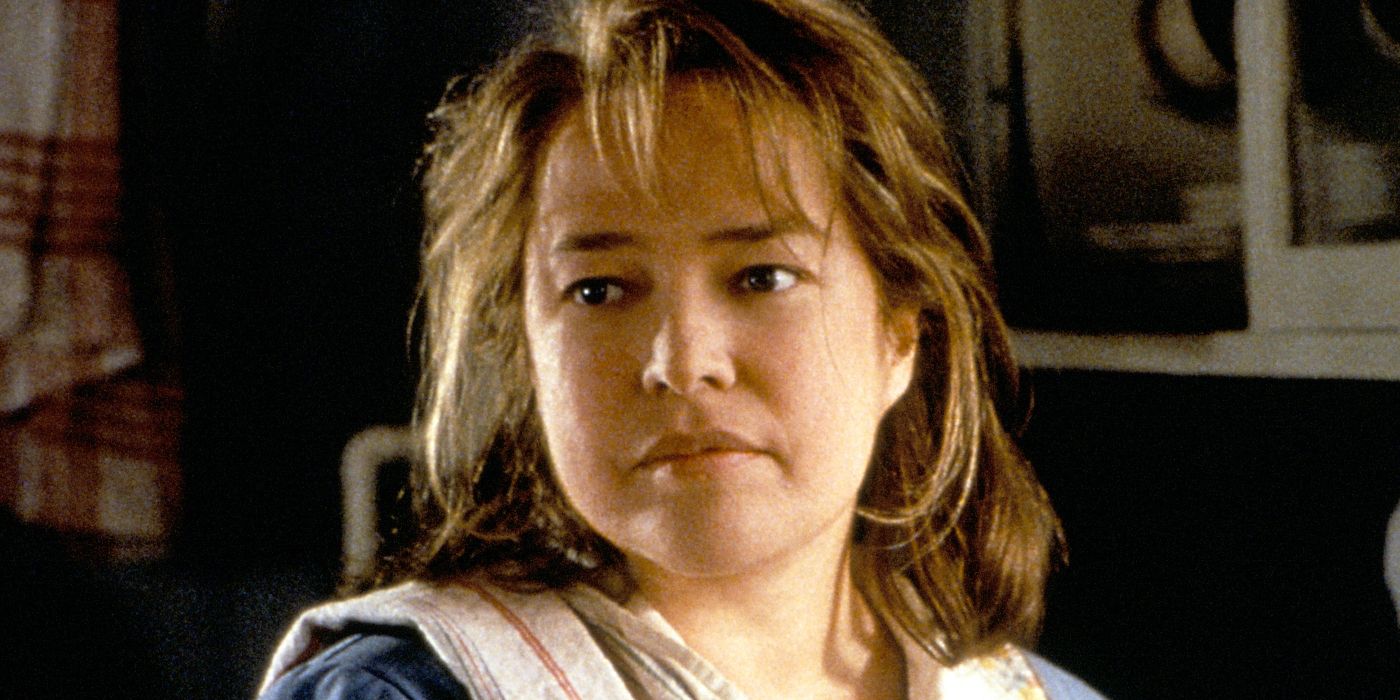“They just cheated us. This isn’t fair. He didn’t get out of the cockadoodie car!” In 1990, Kathy Bates animated Annie Wilkes, one of the most iconic and troubling characters to erupt from Stephen King’s imagination. Whether she was telling her captive, Paul Sheldon (James Caan), about her obsessive love of his work or hobbling him so he can’t escape, Annie kept viewers on the edge of their seats wondering what lunacy she’d further devolve into. While Bates’ role as Annie Wilkes was a triumph, winning her the Academy Award, she starred as another complex woman in a film adapted from a Stephen King novel: the titular Dolores Claiborne.
Released in 1995, Bates’ role in Dolores Claiborne doesn’t lend itself to the insanity of Annie Wilkes, but Dolores does have her secrets and provides a swath of complexity other than just being someone’s number-one fan. She’s a mother, widow, overworked maid, outcast, and a suspect. King has a penchant for writing female characters that are just as tough as the Maine winters, and Dolores is no deviation. She is no stranger to hardship, causing her to develop a calloused demeanor. But Dolores’ ruggedness won’t help her with the conundrum she’s facing. For that, she’ll need someone to step in and give her the help she’d usually reject, just like she needed once before.
As of 2024, Bates has taken the lead role in the legal drama Matlock, which is a gender-flipped reboot of the hit ’80s series starring Andy Griffith. Bates was drawn to the character, feeling like the role was a culmination of everything she had worked toward in her career. With that being said, she also announced that it would likely be her final role. She had initially planned to retire earlier after a difficult experience on a set, but she couldn’t turn away after reading the script for Matlock. “Everything I’ve prayed for, worked for, clawed my way up for, I am suddenly able to be asked to use all of it,” she said of the role in an interview with The New York Times. “And it’s exhausting.” Thus she announced that the role of Matty will be her “last dance”. It’s disappointing news, to say the least, but it also makes for the perfect time to dive into Bates’s back catalog, specifically her more underrated roles. Of course, anything Kathy Bates is a part of is pure gold, but there is one character that tends to get overshadowed by other, more popular characters in her career — and that’s Dolores Claiborne.
What Is ‘Dolores Claiborne’ About?
We see a shadowy struggle; an old woman has fallen or was pushed down the stairs. We see Dolores rushing down to meet the old woman who’s dying at the bottom of the staircase. But she’s not dead yet. Dolores ransacks the kitchen to find the perfect instrument and settles on a marble rolling pin. Just as she’s about to deliver a fatal blow, the door opens, and the mailman sees Dolores standing over the now-deceased miser Vera Donovan (Judy Parfitt). In New York, a young journalist, Selena St.George (Jennifer Jason Leigh), is arguing with her editor about a story that she wants. But a fax comes into her office: Dolores Claiborne has been arrested for the suspected murder of Vera Donovan.
This isn’t a story for Selena to report on; Dolores is her mother. Resentfully, Selena goes to Maine to be with her mother while the investigation is pending. They aren’t close, so much so that when Selena arrives at the sheriff’s station Dolores thinks she’s a lawyer who’s been assigned to her case. It’s clear that Dolores has become the town pariah; people sneer at her in public and her house is vandalized. But Dolores, ever a rock, doesn’t let the public resentment affect her. It’s Selena, with her drinking, smoking, and concoction of pills, that concerns her. Being back home torments Selena; there are so many things there she ran away from, so many things she’s locked out of her memory.
There are flashbacks of earlier years. Dolores, young in a way that reveals just how harrowing the ensuing years would be on her, is a homemaker for her fisherman husband Joe St. George (David Strathairn). Selena is a young girl, enjoying a seemingly carefree adolescence. But things are far from perfect in the St. George house. Dolores falls victim to Joe’s verbal and physical abuse. Eventually, Dolores takes a job as a maid for the cruel and wealthy Vera Donovan, whose personal motto is “Sometimes, being a bitch is all a woman has to hang on to.” And boy does she practice that ethos daily. An ego-bruised detective (Christopher Plummer) is determined to see Dolores changed for murder in Vera’s death, but he has his own motivations for wanting so. Big news travels quickly in a small town, and Dolores finds herself in the crosshairs where grudges, resentment, and reputation all come into play. Will Dolores be a free woman? Should she be a free woman?
How Does Kathy Bates Performance as Dolores Claiborne Compare to the Book?
Adapting Dolores Claiborne for the big screen was always going to require some creative liberties in order to provide a smooth and entertaining watch for audiences. The book takes place entirely in the first-person narrative, told to us by Dolores while she is in police questioning. The movie changes this and instead has Selena come to town when she learns of Vera’s death and Dolore’s potential involvement. Throughout Selena’s visit we see Dolores being questioned and investigated, all the while Selena herself is trying to decipher whether her mother committed the crime she’s been accused of. This offers us a bit more development of Dolores’s character that we don’t receive in the book. Not that Dolores’s development, or any connection you feel to her, is lacking in the book, but it didn’t feel as necessary when we’re already inside her head. In the movie, we are immediately thrust into Dolores’s dreary world and we have to piece together who she is and if we can trust her; or if we even should. And it’s Kathy Bates’ layered performance that eases us into the character’s perspective.
When we first meet Dolores we’re immediately suspecting her of a murder. Of course, we can’t be sure she did it, but the evidence looks all too convincing and she’s not doing much to convince the detectives otherwise. Yet Bates brings such a raw likability to everything she’s in that you can’t help but feel drawn to Dolores. You sympathize with her, you begin to root with her, and yet you sometimes want to take her by the shoulders and shake her until she cooperates. But perhaps most impressively is how she portrays past and present Dolores. They’re the same person, but they feel wildly different from one another. When we first meet past Dolores, she’s youthful and wears pretty sundresses, she smiles and laughs, and she has light in her eyes. Throughout the flashbacks, we see that light slowly begin to dwindle until we arrive at the present-day Dolores who looks worn down and tired, a culmination of years, people, and a life that has been unkind. They’re two sides of the same coin and Bates captures each era of Dolores with such haunting perfection.
‘Dolores Claiborne’ Is a Story Rooted in Reality, Not Horror
Perhaps what’s most misunderstood about Stephen King is the assumption that all of his work is scary. He has certainly earned a reputation for being the King of Horror, but great portions of his writing aren’t focused on gore and frights. Some of his work is political like The Dead Zone. Others, like The Green Mile, involve supernatural elements but aren’t necessarily terrifying. Many who watch Dolores Claiborne would be surprised to learn that it’s based on a Stephen King novel. It has intense elements, but for many, it won’t match their ideas of what a King adaptation would look like. But like with many of his books, King puts much of himself into Dolores Claiborne. Though in New England, Maine is a drastically different state from, say, country club Connecticut.
Mainers are tough people who endure brutal winters — many of King’s Mainers remain cold, even when the ice thaws. Dolores is of that ilk. Her hands crack from the blistering winter wind, and her nose runs in the freezing temperatures, yet she toils away. From his writing and lifetime knowledge of Maine, King has most likely met several Doloreses (hopefully, no Annie Wilkeses, though). The demons of Dolores Claiborne are personal, not supernatural. He might be best known for books like Carrie and The Shining, but King proves that he doesn’t have to rely on the supernatural to write a good tale.
Bates, in a surprise to no one, is masterful in her portrayal of Dolores, and it’s undoubtedly one of her most overlooked performances. The immensely talented Kathy Bates occupies a unique spot in the entertainment industry. She’s an actress which makes her characters believable, whether they’re cold-blooded killers or sweet and doting mothers. Kathy Bates is what happens when a regular person with exceptional talent breaks into Hollywood. The characters she brings to life feel like real people, not just Hollywood’s dramatized idea of ordinary folk. Bates’ Dolores is a tough woman whose life has been anything but easy. She loves her daughter, but her daughter hates her. She works for a nightmare of a boss and is paid below the poverty level. But she wasn’t always this hardened person. Bates is able to bring forth the duality of Dolores: the young mother who’s trying to keep a home together and protect her daughter and the middle-aged pariah who has to push through whatever comes in her path. When asked on Anderson Live who has been her favorite character she has played, Bates answered, “Dolores Claiborne was my favorite because I really got to play a character. Somebody who was very different from me.”
‘Dolores Claiborne’ Is One of King’s Most Feminist Books
King credits his wife Tabitha as his most important advisor. All the books he writes go through the examination of his wife’s opinion. And while King’s understanding of life and people are key elements of his books, Dolores Claiborne has a feminist, female-centric air to it that makes it apparent that his wife’s insights helped structure the novel. The novel at its core is about women having to survive men, and how that can look different for each woman. For Selena, her editor and a former lover used to assign her great stories when they were sleeping together but cast her to the wayside when their nights together ended. And her boss, as we discover, isn’t the only man to have used her.
Dolores not only had to survive her abusive late husband, but she also has to put up with the overzealous detective who’s operating on bitterness rather than professionalism. Dolores encounters an incident with her bank: money she was saving from her alcoholic husband was swiped from under her by him. He tells a doubtful lie to the banker — who’s a man, of course — to procure her funds, and since he’s the husband, he manages to acquire them. Dolores knows that if she, a woman, were to try to pull the same stunt her husband did, it’d never work. Her money is still, despite her best efforts, his money. But Dolores isn’t afraid to call out the innate sexism of the situation.
Vera says it best: “It’s a depressingly masculine world we live in.” Though flawed, Vera’s way of maintaining power, even if it is just over women who work for her, is through her relentless bitchery — “Sometimes, Dolores, sometimes, you have to be a high-riding bitch to survive.” But Vera, like Dolores, isn’t one to sit down and let men ruin them. “An accident, Dolores, can be an unhappy woman’s best friend.” In a Stephen King way, the women in Dolores Claiborne find their own solutions for troublesome men. Joe may think he lords over Dolores, but he, too, learns what a “high-riding bitch” she can be.
‘Dolores Claiborne’ Is a Personal Story For Stephen King
Dolores is also a special character in the King universe because she was inspired by his own mother; he dedicated the book to her. Even though Nellie Ruth Pillsbury King died years before Dolores Claiborne was written, he wanted to write a female character who embodied the same grit his mother had to exercise in her own life. King, whose father abandoned the family and left the responsibility of childrearing on his mother, had this to say about his mother and the many women like her, the Dolores Claibornes of the world,
“After my father took off, my mother landed on her feet scrambling. My brother and I didn’t see a great deal of her over the next nine years. She worked at a succession of low-paying jobs…and somehow she kept things together, as women before her have done and as other women are doing even now as we speak.”
King himself is somewhat of a Selena. Though he had a much better relationship with his mother than Selena had with Dolores, both he and his fictional character managed to make better lives for themselves because of their mother’s self-sacrificing hard work. Selena became a successful journalist, and King became the literary legend that he is. It was King’s mother who first encouraged his writing.
Dolores Claiborne is one of his rare novels that is told entirely in first-person by one character. The Body, otherwise known by its film name Stand by Me, also has a singular narrator. But King didn’t give space to the Joes of the world to share their perspective. Joe doesn’t get to spin his own rendition of events that would distort the cruel reality he creates for Dolores. This is Dolores’ story. Dolores, like so many women in the world like her, including King’s late mother, is given the privilege few women in her position get to have: narrative. Dolores Claiborne is a story for and about women, especially those who find themselves on the lower rungs of the socioeconomic order. For once, it’s their story that gets airtime. Kathy Bates, in her best rough northeastern accent, brought to life one of King’s most relatable characters. Dolores Claiborne may not be telekinetic like Carrie, psychic like Johnny Smith, or have healing powers like John Coffey, but despite her having none of King’s supernatural endowments, she is, nonetheless, a powerful woman.
There’s a reason that Kathy Bates has been the leading lady in two major Stephen King adaptations; she’s so good at digging deep into the inner psyche of complex female characters. She’s able to pull out every intricacy and tick they have and bring them to life with such startling accuracy. Dolores Claiborne is a very desperate woman; she wants to save her daughter and herself in the process. But her desperation doesn’t ever come off as weak; in fact, it only makes her stronger. Bates digs into that, especially when Dolores is having a rare vulnerable moment; she makes sure there is always power in her actions, even when her situation seems hopeless. Dolores Claiborne is truly one of Stephen King’s most underrated and overlooked characters, and sure, maybe it’s because she isn’t supernatural in some way, or a murderess like others, but she’s still a layered and impressive hero that deserves a second look. And it took someone of Kathy Bates’ considerable talent to bring her to life.
Dolores Claiborne is available to rent on Amazon in the U.S.


















